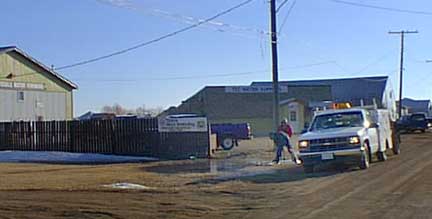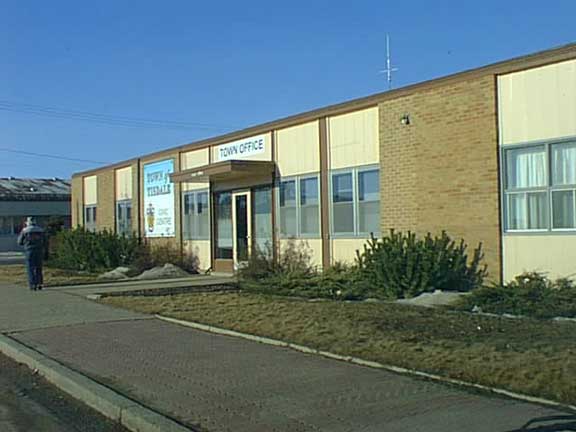 |
| FTLComm - Tisdale - March 21, 2000 |
For more than a year we have heard provincial politicians, mainly the Premier and
some other government cabinet ministers bemoan the large number of rural government
entities.  The Premier has complainted of inefficiency and duplication and that Saskatchewan
has to many small local government operations. During the past two weeks we have
seen several reports coming out of Saskatoon (The Premier's home town) backing up
his claims and recommending the reduction of rural government in Saskatchewan to
a fraction of the present number of municipal governments. The report released today
claims that real efficiency would come from having twelve governments outside of
Regina and Saskatoon.
The Premier has complainted of inefficiency and duplication and that Saskatchewan
has to many small local government operations. During the past two weeks we have
seen several reports coming out of Saskatoon (The Premier's home town) backing up
his claims and recommending the reduction of rural government in Saskatchewan to
a fraction of the present number of municipal governments. The report released today
claims that real efficiency would come from having twelve governments outside of
Regina and Saskatoon.This kind of provincial government complaint is hardly a new thing as it is |
 repeated
every couple of repeated
every couple of decades or when one generation moves along and another takes its place. When the provinces of Saskatchewan and Alberta were formed the provincial governments of 1905 were pretty much overwhelmed and needed to have local services and immediate governmental infrastructure controlled on a local basis and so it was that villages, hamlets, towns and municipal governments were formed. They were, as far as the provincial government was concerned, a necessary evil. The main problem with municipal and local government is not that it wastes tax money or is inefficient but just the opposite. Local government is enormously successful. The people who run for office in local government do so to benefit their community they are almost entirely volunteers and they serve in the spirit of community responsibility. Being elected and often the next door neighbour, they are extremely sensitive to local concerns and respond immediately to local problems. Local government by its nature has to be frugal, it relies upon small provincial grants, but mostly on local taxes to keep thing working and by necessity has to really run a tight carefully funded operation. The picture at the top of the page is of the Royal Municipal office here in Tisdale and is a shared office between two local municipalities. Shared operations of all kinds are the order of the day, be that fire fighting, ambulance or special equipment, these governments know how to work together and share the cost of things. The idea that there is duplications and waste is simply not the case. The governments themselves cost almost nothing to operate since the counsellors are just citizens doing their duty. |
 The story is very much the same for Saskatchewan's small towns and cities. They also work together and share their equipment, manpower and run on very tight budgets. The results can be seen where ever you go in Saskatchewan, civic pride and extreme efforts by each community to do their best in making their communities outstanding places to live and work. All of the pictures on this page were taken this morning before 9:00 and you can see |
 municipal
road patrol is being municipal
road patrol is beingreadied for its work for the day, town crews are attending to build up of melt water. Things are working as they should. From the available evidence, the Premier's complaints about local government and the studies he has commissioned to get rid of local government make no sense. "If its not broken, don't fix it!" is good advise and there is no evidence of waste in provincial local government. But what there is and it is everywhere, is democracy. Local control and local government are firmly in the hands of the |
 voters and
tax payers. This voters and
tax payers. Thisis the real culprit in the mind of the Premier. The rural municipalities and the governments of Saskatchewan's towns and small cities are a persistent thorn in his side. They respond to the demands of their voters and will not jump to the whims of the provincial government. It was in the 60s that the provincial government was experiencing similar problems and having difficulty bullying the municipal governments that it decided to solve the problem by establishing Alberta style "counties" in Saskatchewan. It was thought that by doing this the county governments would be more manageable, the provincial government would be able to strangle them by controlling their grants and make them obedient. The project failed completely and forty years later the provincial bosses are having another go at grabbing control of local government. The reason for local power is that the municipal and small town and city governments are self sufficient. They have a tax base and live within their budgets. The provincial government can not control them because it does not have control over their purse strings and so the only thing to do is claim that there is waste and duplication. It would take little imagination to realise what a mess the provincial government could make of the province were it to run the rural municipalities and rural communities with the same blinding efficiency that we see with the Department of Highways or the masters of tax wasters, the provincial department of health. The local hospitals were all originally managed efficiently by their own boards, in each community. The provincial government established Regional health districts and wiped out the local control closed 55 hospitals and the cost of health care in the province has almost doubled as a result. But, and this is the main point, the establishing of the Regional health districts moved control from the local communities to the central provincial authorities and that was the primary goal in the first place. Now with municipal government the goal is the same, wrest control from the local people and thus increase the central control and authority by the provincial government. What we are seeing is a power struggle. In a power struggle cost and waste of money are not a factor because the goal is to gain control and if their is a huge waste of money it doesn't matter because the same tax payer will have to pay for it under any circumstances. The other important factor is that all changes are permanent so if there is some discomfort for a while it will be irriversible and the rural people can either put up with it or move to the city, either way the control will have shifted to the central authority. The provincial government has a "Borg" mentality, it thrives on and demands more and more control over everything, the axiom is a simple one, POWER IS EVERYTHING. But just as with the fictional characters The Borg, "resistance if futile." |
 |